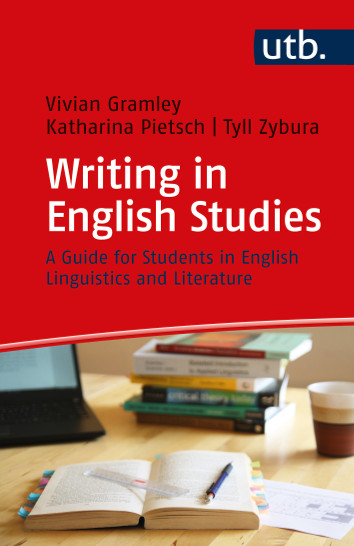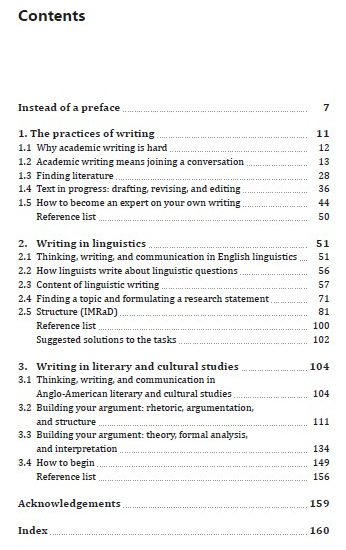Podcast: Writing in English Studies
In this episode, we discuss Tyll’s and Katharina’s recent book publication – Writing in English Studies: A Guide for Students in English Linguistics and Literature.
In this episode, I talk to Tyll and Katharina about their recent book publication Writing in English Studies: A Guide for Students in English Linguistics and Literature, which they co-authored with Vivian Gramley. We discuss not only how the book can help students become confident authors of academic texts, but also the politics that are part of the process of being and becoming an academic writer.
Buy Writing in English Studies: A Guide for Students in English Linguistics and Literature here.
The publisher has also released an excerpt of a few pages (from the section “How to become an expert on your own writing”) – have a look at it if you like.
References
- Gramley, Vivian, Katharina Pietsch, Tyll Zybura. Writing in English Studies: A Guide for Students in English Linguistics and Literature. Barbara Budrich, 2020.
Music © by Lily Olason.

 Like on Instagram
Like on Instagram
Kommentare
Sophia
15. Juni 2020
Thanks for another great podcast episode! I really appreciated this one - reminding me that as a student I can be an expert too and that what I have to say is a valid result of diligent research and analysis.
One of my teachers that I had during my semester abroad always wrote an essay too when he assigned one to his students. In his class, we wrote three essays and sharing our writing and editing process was always a crucial part of the class. This is when I realized that writing isn't just writing - a big part of it is editing. Because he shared his drafts, his struggles, his thought processes, and strategies with us this became more obvious. I was very impressed that he as a teacher was so open about his writing process and I hope others do the same. :)
This teacher also said that in academia writing is taken for granted, dubbed a skill that students naturally acquire during their studies, and therefore not explicitly taught. As a result, he often receives emails in which students talk about their struggles, because they're confused why they can't perform a skill that they're expected to know. He replies with "Yeah, no shit - writing is hard". And as blunt as this may sound, I needed to hear that too. Writing is difficult, frustrating, and messy and it's totally normal to struggle in the process.
Sister Rose
15. Juni 2020
"I still get sh*t done." One of the best lines in the podcast. You go, Tyll. Definitely a fan, and I can't wait to read this and apply these ideas in my classes. I'm sold.
Katharina Pietsch
15. Juni 2020
Hey Sophia, thanks for sharing your experience with that writing class – that teacher’s approach to teaching writing sounds awesome!
The very first chapter in our book is actually titled “Why academic writing is hard” because it was very important to me to have that acknowledged in the book.
Also, I really like your teacher’s approach of writing his own essays during the course of the class: in my ‘Writer’s Room’ block seminar in February I intended to do the same thing – writing my own blog post using the same writing strategies and processes everyone else did. I didn’t manage to pull it off, though, because as this was a one-week block seminar, I didn’t have enough time to both write my text and be available for students’ questions and concerns or to feedback their draft texts (which I had decided early on should always take priority). I still think this is an amazing teaching practice – for ‘modeling’ a writing process, for showing that even for more experienced writers the first draft can look very different from the finished text, and also for subverting the usual instructor versus student divide in the classroom. I really enjoyed being part of the class and its writing activities in the first two days (until I had to stop working on my own text) in a way that a teacher usually is not – as someone working towards the same goal as everyone else and struggling with the same things as everyone else and not just as someone who tells others what to do.
Florian Kelle
16. Juni 2020
THIS is the kind of writing guideline I would have loved to have had during my BA! As much as I think that my development as an academic writer has been concurrent with this, having this in written form would have provided me with an experience wholly different coming to the conclusions on my own in retrospection.
I have taken a few seminars on (academic) writing, and they have certainly helped me in my development. But, none of them achieved much in the sense of introspection or individuality. Writing advice really has to go beyond the formal approaches and focus more on the demands of the individual. Especially in the humanities I feel like it's more about doing things well, rather than "right". And that is best achievable through supporting whatever idiosyncrasy is available within the student already. The specific literacy that you mentioned is another pillar of building up competency. Whatever you are familiar and comfortable with, and writing about that, can give your personal development a huge boost. Once you are familiar with something, you can start extending your way of reasoning towards other fields.
Like Tyll, I am a binge-writer. Drafts make no sense to me. I have come to terms with the fact that I create a lot of (mental) notes before writing anything and all. Yet, what I write can usually stay without any major editing. It's a tedious process but it is a way for me to discursively engage with myself and grow.
Jenny
16. Juni 2020
I again really enjoyed this episode of your podcast, thank you for recording these!
This has reminded me of reading an early version of your book, and how comforting and reassuring that had felt compared to the usual discourse surrounding academic writing. Especially in direct contrast with other writing guides I’ve looked at recently, it really feels like you guys are breaking the mould with this.
While some is discipline-specific, a lot of it feels really valuable for writing in any discipline (including the natural sciences), for example how you conceptualise the process of producing text as consciously taking charge of your own strategies and not feeling guilty or inadequate about them. Likewise I think anyone writing academic text could profit from what you say about owning one’s text rather than hiding oneself and one’s position, and about leaving the typically passive role of student-being-supervised-by-expert-scholar and instead assuming agency in the supervision (asking for things that would be helpful to you, expecting things from your supervisor and not just the other way around) – all of which I always struggled with regardless of what discipline I was writing in.
Füge einen Kommentar hinzu